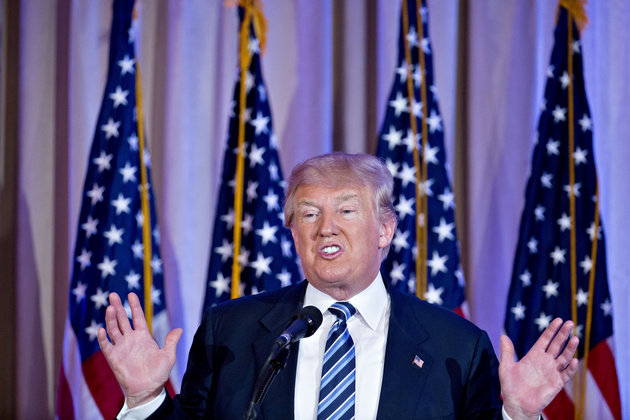
Since the start of his presidential campaign, Donald Trump has distinguished himself from his Republican rivals by pledging not to cut Social Security and Medicare. It's a pledge he repeated at the GOP debate in Miami Thursday night.
"I will do everything within my power not to touch Social Security, to leave it the way it is; to make this country rich again," he said Thursday.
"It's my absolute intention to leave Social Security the way it is," he added. "Not increase the age and to leave it as is."
Trump repeated that he would accomplish this by making "America rich again," mostly by negotiating better trade deals.
Like his hostility toward free-trade agreements, Trump’s promise to protect Social Security shows he has benefitted politically from jettisoning Republican economic orthodoxy in favor of a populist platform. But Trump’s past statements suggest that his opposition to cutting Social Security is merely political posturing that he would dispense with once elected.
In 2011, when Trump was openly considering a presidential run, he expressed approval of bipartisan talks on a budget deal that would cut Social Security and Medicare and raise revenues as part of a debt ceiling increase.
“But how do we get this debt under control? Do you think, do we have to look at everything, is there anything you don’t cut?” radio host Dave Price asked Trump in March of that year.
“You really have to look at everything,” Trump affirmed. “I must tell you, the Republicans and the Democrats are starting to say -- and it’s very interesting ‘cause the entitlements, and you have all the other things that people are saying have to be cut and nobody wants to bring it up. But they’re really starting to say now that they’re going to have to look at that whether they like it or not.”
He admitted to Price that demanding greater concessions from other countries in trade deals -- the heart of his current plan to “make the country rich again” -- was likely not enough to put Social Security and Medicare on solid financial footing.
Cutting the popular social insurance programs would “probably” be necessary, Trump said, “unless I’m really 100 percent right about the ripoff of our country by other countries.”
A month later, Trump reiterated his belief that Social Security and Medicare should be cut in an interview with Fox News’ Sean Hannity.
But Trump said that it was too politically costly for Republicans to propose it first, without Democratic buy-in.
“The real money... the trillions are in Social Security, Medicare, Medicaid, there's got to be some adjustment,” Hannity suggested.
“Things have to be done, but it has to be done with both parties together,” Trump responded. “You can't have the Republicans get too far ahead of this issue.”
“They are going to lose elections,” he added.
Trump singled out now-Speaker Paul Ryan (R-Wis.), who was then the chair of the House Budget Committee Chair, for political criticism. Trump said Ryan’s budget, which proposed transforming Medicare into a voucher program, endangered the party politically.
“I have a lot of respect for Paul Ryan,” Trump said. “I do worry that he's a little bit far out in front because the Democrats are going to take that Medicare word, that little word called Medicare which to a lot of people mean seniors citizens. And they are going to take that word, and they're going to say, ‘oh, senior, senior.’ And the Republicans have to be careful not to fall into a Democratic trap.”
Trump reiterated his negative assessment of the Ryan budget in an interview that July with conservative writer Erick Erickson, calling it “political suicide for the Republican party.”
That candor is all but gone in the current presidential run. Trump has only on rare occasions allowed his previous views on Social Security and Medicare to surface.
Asked by ABC’s George Stephanopoulos on Oct. 25 whether he agreed with Ben Carson that Medicare would need to be phased out, Trump said, “It’s possible. You’re going to have to look at that.”
Perhaps remembering his own political advice, Trump walked back the statement two days later.
“Abolishing Medicare, I don't think you'll get away with that one,” Trump said on MSNBC’s “Morning Joe.” "It's actually a program that's worked. It’s a program that some people love, actually.”
UPDATE: 7:20 p.m. -- AARP, which is campaigning to get presidential candidates to offer detailed proposals for reforming Social Security, responded to the apparent contradiction in Trump's statements by reiterating its call for him to lay out a plan.
"Older Americans find It to be a true test of leadership for our presidential candidates to have a plan for Social Security and Donald Trump is the only candidate running who has no plan," John Hishta, senior vice president of AARP, said in a statement. "We think he owes it to Americans of all ages to take a stand."


